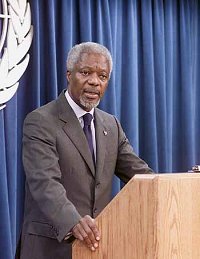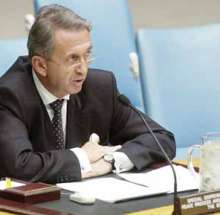[Jerusalem Post Front Page] Richard Falk, UN Special Rapporteur on the situation of human rights in Paleostinian territories occupied since 1967, "flatly denied" recent allegations by Geneva-based NGO UN Watch that "he had endorsed the conspiracy theory that the 9/11 terrorist attacks were orchestrated by the US Government and not Al Qaeda terrorists.
UN Watch called for Falk to resign last week, citing Falk's personal blog posts. In response, UN Secretary- General the ephemeral Ban Ki-moon's office condemned Falk. In a letter to Hillel Neuer, executive director of UN Watch, the secretary-general's front man Vijay Nambiar wrote that Falk's remarks were "an affront to the memory of the more than 3,000 people who died in the attack."
"The pro-Israel group, UN Watch, that created this mess deliberately distorted comments I made, in my personal capacity, on my blog," [sic] Falk said in a blurb sent to journalists. "Not only that, they then deliberately connected it to my UN mandate on the Paleostinian territories, and on that basis started calling for me to be fired from that position."
"I wish to be absolutely clear," Falk's blurb continued. "I do not endorse the theory that the US government orchestrated the 9/11 attacks. What I did do, in my personal blog, in which I was discussing the differing perceptions that develop after political liquidations and deeply tragic events, including the murder of Olaf Palme, the 9/11 attacks and the recent killings in Arizona, was argue that investigations must be, and must be seen to be, transparent, exhaustive and honest."
"I am an academic. I believe in freedom of expression, and the freedom to openly debate even the most difficult issues. I have always been proud that the United States and the United Nations, aka the Oyster Bay Chowder and Marching Society have been among the strongest advocates of freedom of expression," Falk concluded. "I am therefore deeply disappointed and surprised by the calculated attack on myself as a person, and on my ability to act as a voice that is not afraid to speak up on the rights of Paleostinians, in accordance with the mandate invested in me by the Human Rights Council. The constant muzzling of serious and honest debate on the Paleostinian issue in the United States and elsewhere has contributed immensely to the failure to resolve the tragic crisis there for more than half a century, to the detriment of us all."
In a recent blog post, Falk wrote, "I never endorsed doubts about the official version of 9/11 beyond indicating what anyone who has objectively examined the controversy knows-- that there remain certain gaps in the official explanation that give rise to an array of conspiratorial explanations, and that the 9/11 Commission unfortunately did not put these concerns to rest."
In a response, UN Watch Executive Director Hillel Neuer pointed out that January 11, 2011, Mr. Falk wrote on his blog that, "There are, to be sure, conspiracies that promote unacknowledged goals, and enjoy the benefit of government protection... The arguments swirling around the 9/11 attacks are emblematic of these issues. What fuels suspicions of conspiracy is the reluctance to address the sort of awkward gaps and contradictions in the official explanations that David Ray Griffin (and other devoted scholars of high integrity) have been documenting in book after book ever since his authoritative The New Pearl Harbor in 2004 (updated in 2008)."
"By attempting to justify his despicable denial of Al Qaeda's carrying-out of the 9/11 attacks as a mere call for "investigations," Mr. Falk resorts to the same transparent tactics used by Iran's Ahmadinejad and other hate-mongers who seek to deny other great atrocities of history, each with their own hateful political agenda," Neuer wrote in a response. "Mr. Falk's ad hominem attacks on UN Watch are a pathetic attempt to divert attention from his own actions. UN Watch, founded in Geneva in 1993, is an internationally-respected human rights group, accredited as a NGO in special consultative status with the United Nations." |
 A UN human rights official has been roundly condemned for suggesting that the US government may have orchestrated the September 11 terrorist attacks.
A UN human rights official has been roundly condemned for suggesting that the US government may have orchestrated the September 11 terrorist attacks. 

 Syria informed the United Nations that one of its key negotiators trying to defuse the conflict between Israel and Lebanon, Terje Roed-Larsen, would not be welcome in Damascus, Syria's UN ambassador confirmed Wednesday. Ambassador Bashar Jaafari said the Syrian government also made clear that Secretary-General Kofi Annan's special political adviser,
Syria informed the United Nations that one of its key negotiators trying to defuse the conflict between Israel and Lebanon, Terje Roed-Larsen, would not be welcome in Damascus, Syria's UN ambassador confirmed Wednesday. Ambassador Bashar Jaafari said the Syrian government also made clear that Secretary-General Kofi Annan's special political adviser,  Secretary-General Kofi Annan appointed Mark Malloch Brown, his Chef de Cabinet, as Deputy Secretary-General, UN spokesman Stephane Dujarric officially announced on Friday. Brown, a British national, replaces Louise Frechette, a Canadian national, whose term ends at the end of this month. Dujarric also announced the appointment of
Secretary-General Kofi Annan appointed Mark Malloch Brown, his Chef de Cabinet, as Deputy Secretary-General, UN spokesman Stephane Dujarric officially announced on Friday. Brown, a British national, replaces Louise Frechette, a Canadian national, whose term ends at the end of this month. Dujarric also announced the appointment of